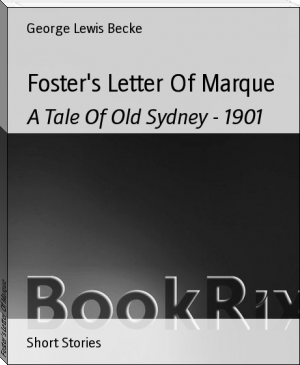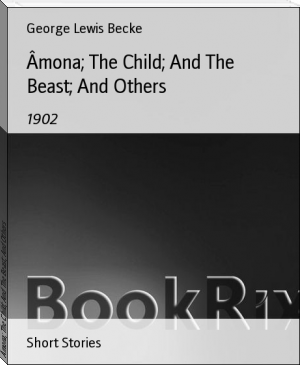Pàkia by George Lewis Becke (best books to read for self development .TXT) 📕

- Author: George Lewis Becke
Book online «Pàkia by George Lewis Becke (best books to read for self development .TXT) 📕». Author George Lewis Becke
Late one evening, when the native village was wrapped in slumber, Temana and I brought our sleeping-mats down to the boat-shed, and spread them upon the white, clinking sand. For here, out upon the open beach, we could feel a breath of the cooling sea-breeze, denied to the village houses by reason of the thick belt of palms which encompassed them on three sides. And then we were away from Malepa's baby, which was a good thing in itself.
Temana, tall, smooth-limbed, and brown-skinned, was an excellent savage, and mine own good friend. He and his wife Malepa lived with me as a sort of foster-father and mother, though their united ages did not reach mine by a year or two.
When Malepa's first baby was born, she and her youthful husband apologised sincerely for the offence against my comfort, and with many tears prepared to leave my service. But although I was agreeable to let Malepa and her little bundle of red-skinned wrinkles go, I could not part with Temana, so I bade her stay. She promised not to let the baby cry o' nights. Poor soul. She tried her best; but every night--or rather towards daylight--that terrible infant would raise its fearsome voice, and wail like a foghorn in mortal agony.
We lit our pipes and lay back watching a moon of silvered steel poised 'midships in a cloudless sky. Before us, unbroken in its wide expanse, save for two miniature islets near the eastern horn of the encircling reef, the glassy surface of the sleeping lagoon was beginning to quiver and throb to the muffled call of the outer ocean; for the tide was about to turn, and soon the brimming waters would sink inch by inch, and foot by foot from the hard, white sand, and with strange swirlings and bubblings and mighty eddyings go tearing through the narrow passage at eight knots an hour.
Presently we heard a footfall upon the path which led to the boat-shed, and then an old man, naked but for his _titi_, or waist-girdle of grass, came out into the moonlight, and greeted us in a quavering, cracked voice.
"_Aue!_ white man, my dear friend. So thou and Temana sit here in the moonlight!"
"Even so, Pakfa, most excellent and good old man. Sit ye here beside us. Nay, not there, but here on mine own mat. So. Hast thy pipe with thee?"
The ancient chuckled, and his wrinkled old face beamed as he untwisted a black and stumpy clay from his perforated and pendulous ear-lobe, which hung full down upon his shoulder, and, turning it upside down, tapped the palm of his left hand with it.
"See!" he said, with another wheezing, half-whispered, half-strangled laugh, "see and hear the emptiness thereof! Nothing has been in its belly since cockcrow. And until now have I hungered for a smoke. Twice did I think to come to thee to-day and ask thee for _kaitalafu_ (credit) for five sticks of tobacco, but I said to my pipe, 'Nay, let us wait till night time.' For see, friend of my heart, there are ever greedy eyes which watch the coming and going of a poor old man; and had I gotten the good God-given tobacco from thee by daylight, friends would arise all around me as I passed through the village to my house. And then, lo, the five sticks would become but one!"
"Pakia," I said in English, as I gave him a piece of tobacco and my knife, "you are a philosopher."
He stopped suddenly, and placing one hand on my knee, looked wistfully into my face, as an inquiring child looks into the eyes of its mother.
"Tell me, what is that?"
I tried to find a synonym. "It means that you are a _tagata poto_--a wise man."
The old, brown, bald head nodded, and the dark, merry eyes danced.
"Aye, aye. Old I may be, and useless, but I have lived--I have lived. And though when I am dead my children and grandchildren will make a _tagi_ over me, I shall laugh, for I know that of one hundred tears, ninety and nine will be for the tobacco and the biscuit and the rice that with me will vanish!"
He filled and lit his pipe, and then, raising one skinny, tattooed arm, pointed to the moon.
"Hast such a moon as that in _papalagi_ land?"
"Sometimes."
"Aye, sometimes. But not always. No, not always. I know, I know. See, my friend; let us talk. I am full of talk to-night. You are a good man, and I, old Pakfa, have seen many things. Aye, many things and many lands. Aye, I, who am now old and toothless, and without oil in my knees and my elbows, can talk to you in two tongues besides my own.... Temana!"
"_Oi_, good father Pakia."
"Go away. The white man and I would talk."
I placed my hand on the bald head of the ancient "Temana shall go to the house and bring us a bottle of grog. We will drink, and then you shall talk. I am one who would learn."
The old man took my hand and patted it "Yes, let us talk to-night And let us drink grog. Grog is good to drink, sometimes. Sometimes it is bad to drink. It is bad to drink when the swift blood of youth is in our veins and a hot word calls to a sharp knife. Ah! I have seen it! Listen! Dost hear the rush of the lagoon waters through the passage? That is the quick, hot blood of youth, when it is stirred by grog and passion, and the soft touch of a woman's bosom. I know it I know it. But let Temana bring the bottle. I am not afraid to drink grog with _thee_, Ah, thou art not like some white men. Thou can'st drink, and give some to a poor old man, and if prying eyes and babbling tongues make mischief, and the missionary sends thee a _tusi_ (letter), and says 'This drinking of grog by Pakia is wrong,' thou sendest him a letter, saying, 'True, O teacher of the Gospel. This drinking of grog is very wrong. Wherefore do I send thee three dollars for the school, and ask thy mercy for old Pakfa, who was my guest.'"
I slapped the ancient on his withered old back.
"To-night ye shall drink as much grog as ye like, Pakfa. The missionary is a good man, and will not heed foolish talk."
Pakfa shook his head. "Mareko is a Samoan. He thinketh much of himself because he hath been to Sini (Sydney) and stood before many white gentlemen and ladies, and told them about these islands. He is a vain fool, though a great man here in Nukufetau, but in Livapoola{*} he would be but as a pig. Livapoola is a very beautiful place, full of beautiful women. Ah! you laugh.... I am bent and old now, and my bones rattle under my skin like pebbles in a gourd. Then I was young and strong. Listen! I was a boat-steerer for three years on a London whaleship. I have fought in the wars of Chile and Peru. I can tell you many things, and you will understand.... I have seen many lands."
Temana returned with a bottle of brandy, a gourd of water, and three cups.
"Drink this, Pakfa, _taka ta-ina_{**} And talk. Your talk is good to hear. And I can understand."
* Liverpool.
**Lit, dear crony.
He drank the liquor neat, and then washed it down with a cupful of water.
"_Tapa!_ Ah, the good, sweet grog! And see, above us is the round moon, and here be we three. We three--two young and strong, one whose blood is getting cold. Ah, I will talk, and this boy, Temana, will learn that Pakia is no boasting old liar, but a true man." Then, suddenly dropping the Nukufetau dialect in which he had hitherto spoken, he said quietly in English--
"I told you I could speak other languages beside my own. It is true, for I can talk English and Spanish." Then he went back into native: "But I am not a vain old man. These people here are fools. They think that because on Sundays they dress like white men and go to church five times in one day, and can read and write in Samoan, that they are as clever as white men. Bah! they are fools, fools! Where are the strong men of my youth? Where are the thousand and two hundred people who, when my father was a boy, lived upon the shores of this lagoon? They are gone, gone!"
"True, Pakfa. They are gone."
"Aye, they are perished like the dead leaves. And once when I said in the hearing of the _kaupule_ (head men) that in the days of the _po-uri_ (heathen times) we were a great people and better off than we are now, I was beaten by my own grand-daughter, and fined ten dollars for speaking of such things, and made to work on the road for two months. But it is true--it is true. Where are the people now? They are dead, perished; there are now but three hundred left of the thousand and two hundred who lived in my father's time. And of those that are left, what are they? They are weak and eaten up with strange diseases. The men cannot hunt and fish as men hunted and fished in my father's time.
"_Tah!_ they are women, and the women are men, for now the man must work for the woman, so that she can buy hats and boots and calicoes, and dress like a white woman. Give me more grog, for these things fill my belly with bitterness, and the grog is sweet. Ah! I shall tell you many things to-night."
"Tell me of them, old man. See, the moon is warm to our skins. And as we drink, we shall eat. Temana here shall bring us food. And we shall talk till the sun shines over the tops of the trees on Motu Luga. I would learn of the old times before this island became _lotu_ (Christianised)."
"_Oi._ I will tell you. I am now but as an old, upturned canoe that is used for a sitting-place for children who play on the beach at night. And I am called a fool and a bad man, because I sometimes speak of the days that are dead. Temana, is Malepa thy wife virtuous?"
"_Se kau iloa_" ("I do not know"), replied Temana, with a solemn face.
"Ah, you cannot tell! Who can tell nowadays? But you will know when some day she is fined five dollars. In my time if a man doubted his wife, the club fell swiftly, or the spear was sped, and she was dead. And, because of this custom, wives in those days were careful. Now, they care not, and are fined five dollars many times. And the husband hath to pay the fine!" He laughed in his noiseless way, and then puffed at his pipe. "And if he cannot pay, then he and his wife, and the man who hath wronged him, work together on the roads, and eat and drink together as friends, and are not ashamed. And at night-time they sing hymns together!"
"People must be punished when wrong is done, Pakia," I said lamely.
"Bah! what is five dollars to





Comments (0)